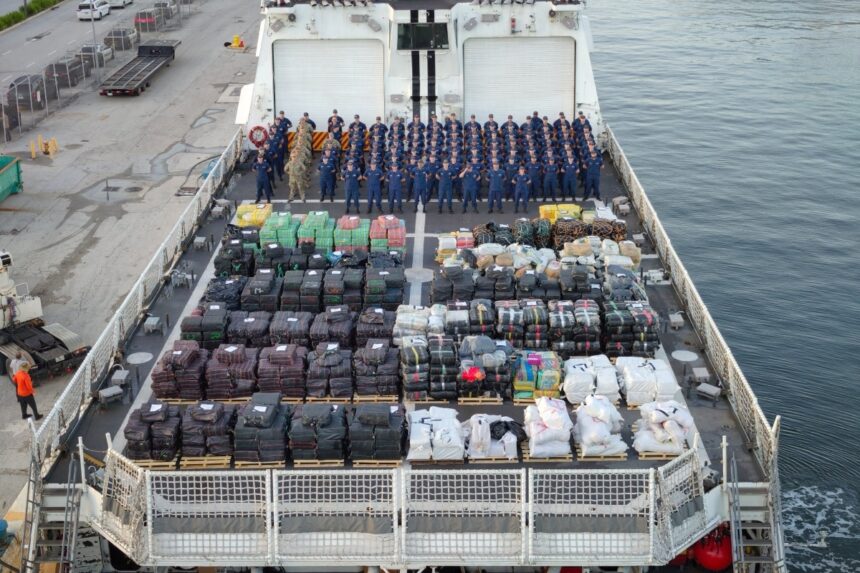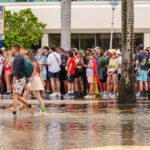The U.S. Coast Guard announced the seizure and unloading of more than 34 tons of narcotics in the port of Everglades, Florida, following operations in the Atlantic and Pacific oceans over the past four months.
The authorities pointed out that this is the largest amount of drugs unloaded in a single operation in the history of the institution.
Record drugs seizures in Florida
According to the official statement, the intercepted cargo is equivalent to 76,140 pounds (34,536 kilograms) of illicit drugs, mainly 28 tons of cocaine and 6.5 tons of marijuana, with an estimated black market value of US$473 million.
The drugs were seized during 19 separate operations between June 26 and August 18 in the Eastern Pacific Ocean and the Caribbean Sea, areas that form part of the main drug trafficking routes to the United States.
Rear Admiral Adam Chamie, commander of the Coast Guard’s Southeast District, explained the magnitude of the find with a stark comparison:
“The 23 million lethal doses of cocaine seized by the Coast Guard and our partners is enough to cause a fatal overdose for the entire population of the state of Florida,” he said.
This type of message is intended to raise awareness of the danger posed by drug shipments attempting to enter the country, both in terms of public health and national security.
The largest offshore operation
Among the seizures was the one made on July 23, 2025, when the Coast Guard intercepted a vessel carrying more than four tons of cocaine southeast of Socorro Island, Mexico.
Officials said the operation was made possible by the coordination of Coast Guard vessels, helicopter squadrons, U.S. Navy units and other strategic assets deployed in the region.
The statement noted that these operations would not have been possible without international cooperation and joint work with other US federal agencies. In particular, they highlighted the collaboration of the Drug Enforcement Administration (DEA) and agencies from Latin American countries, which was key to tracking and intercepting the vessels before they reached U.S. territory.
Florida, due to its strategic location in the Caribbean, remains one of the main entry points for drugs into the country. In this sense, the Coast Guard insisted that it will reinforce its maritime patrols to maintain pressure on drug trafficking networks.
Impact for the U.S. Hispanic community.
The seizure is relevant not only because of its magnitude, but also because of the effect it seeks to generate in Hispanic communities in Florida and other states in the country, where drug use and trafficking have direct consequences on public safety.
Community organizations have insisted that large seizures should be complemented by prevention and addiction care programs, since, despite efforts, the flow of narcotics into the United States continues unabated.
The Coast Guard stressed that it will continue to deploy large-scale operations in the Caribbean and Eastern Pacific for the remainder of the year.
The objective is not only to intercept shipments, but also to dismantle the criminal networks behind drug trafficking.
This historic record drug seizure in Florida marks a new milestone in the fight against drug trafficking and sends a clear message.
The U.S. government seeks to keep cartels operating in international waters under pressure by protecting the population from the devastating effects of illicit drug use.
The 23 million lethal doses of cocaine seized by the Coast Guard and our partners is enough to cause a fatal overdose for the entire population of the state of Florida
Adam Chamie























